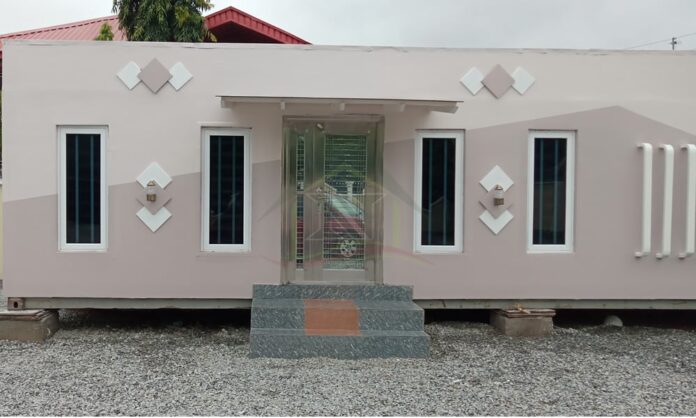The construction industry in Nigeria is currently grappling with a significant challenge—the escalating price of cement. This has positioned alternative construction materials at the forefront of discussions among builders, architects, and prospective homeowners. One such alternative gaining traction is container houses, which offer a unique blend of affordability, sustainability, and adaptability.
The Context of Rising Cement Prices
According to reports, cement prices in Nigeria have surged dramatically, impacting the housing market and making it increasingly challenging for individuals and families to afford conventional brick and mortar houses. Cement, a fundamental component in traditional construction, is becoming a bottleneck for many aspiring homeowners who now find themselves searching for economically viable alternatives.
Amidst this backdrop, container houses are emerging as a practical solution. These innovative homes utilize repurposed shipping containers, turning what was once wasted metal into functional living spaces.
The Appeal of Container Houses
Container houses are not only cost-effective but also provide a host of other advantages that align with contemporary concerns about sustainability and efficiency. Here are some of the notable benefits:
1. Faster Construction
One of the most appealing aspects of container homes is their prefabricated nature, which allows for swift assembly. Unlike traditional homes that can take months to construct due to the need for extensive labor and materials, container homes can be set up in a fraction of the time. This efficiency is particularly beneficial for individuals eager to move into their new spaces without prolonged delays.
2. Sustainability Matters
In an age where environmental concerns are paramount, container homes stand out as a sustainable choice. By repurposing used shipping containers, this method of construction minimizes waste and reduces the demand for new raw materials. The reduced carbon footprint is a significant advantage for environmentally-conscious buyers.
3. Durability and Strength
Shipping containers are designed to endure harsh conditions during transit. Their robust structure and durability make them an excellent choice for building homes that can withstand the elements and for safe, long-lasting living environments.
4. Design Versatility
The modular nature of shipping containers allows for remarkable design flexibility. They can be stacked, combined, and customized to suit various layouts and aesthetic preferences. This adaptability means homeowners can create their dream spaces without being restricted by traditional architectural norms.
The Future Landscape of Container Homes
As the costs associated with traditional housing rise and the demand for affordable housing intensifies, container homes have the potential to transform Nigeria’s construction sector. The global container homes market is projected to reach $73.07 billion by 2025, with a compound annual growth rate (CAGR) of 6.5%. This growth is driven by several factors, including reduced construction times, cost effectiveness, and a shift toward green building practices.
Addressing Barriers to Adoption
Despite the promising landscape for container homes, several challenges hinder their widespread adoption in Nigeria:
-
Limited Awareness: The concept of container housing is still relatively new within the Nigerian market. Increased education and awareness campaigns are necessary to familiarize the public and prospective buyers with the benefits of this alternative construction method.
-
Regulatory Hurdles: Navigating the relevant regulations and securing building permits can be complex. Streamlining these processes will be vital for promoting the adoption of container homes.
- Insulation Needs: Due to their metallic structure, proper insulation is vital to ensure thermal comfort, especially in Nigeria’s hot climate. Investment in effective insulation solutions may initially increase costs but will provide long-term comfort and energy efficiency.
Looking Ahead
In conclusion, as the demand for affordable housing options continues to grow, container homes presents an innovative and feasible alternative for many Nigerians. These structures not only hold potential for addressing the current cement price crisis, but they may also play a pivotal role in shaping the future of construction in the country.
Emerging market players and government initiatives that support sustainable practices will no doubt play an essential role in accelerating the growth of this sector. The synergy of innovative building techniques with environmentally conscious practices could lead to a brighter, more sustainable future for Nigerian housing.
Showcasing Container Home Designs
To inspire visions of what container homes can achieve, several architectural designs stand out, making them not only functional but visually appealing. Below are images depicting some stunning examples of container houses:



As we navigate the challenges of the housing market, container homes may well represent a step toward sustainable and affordable living, harnessing the potential of creativity, innovation, and environmental responsibility.














